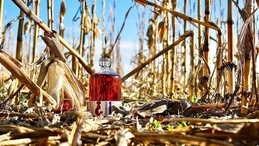Addicted to Food: Hooked on Legal White Powders, She Battled a Food Addiction
March 19, 2003
Some 58 million Americans are overweight according to theThe National Institute of Diabetes and Digestive and
Kidney Diseases, a branch of National Institute of
Health. Obesity-related illnesses are the second
leading cause of premature death in this country.
Despite this health crisis there are limited resources
to help people develop healthy relationships with
food.
In this interview, 47-year-old Valorie Gibbs of
Solon Township explains how she is recovering from an
addiction to food which almost killed her.
NE: Can you give me background of the history of your
relationship with food?
Valorie: I think the history of my relationship with
food is pretty typical of anybody that struggles with
this problem. How I grew up almost doesn‘t seem
relevant to me. I think I have a pretty average
background and this problem seems to touch anybody and
everybody.
NE: Okay, what is food addiction?
Valorie: It was in the most part a very slow evolution
for me to get as big as I was. I got up to 347 pounds.
Most of my adult life I spent slowly inching the
pounds on. I became a professional dieter and
exerciser and I spent most of my adult life and some
of my teen years in a range of 20 to 40 pounds
overweight. I probably gained and lost hundreds of
pounds over the years because I kept wanting to think
that I was a normal eater. I developed this whole
elaborate system in my head that I had to constantly
prove that I was a normal eater.
NE: How were you eating?
Valorie: I have learned that I am a food addict and
that I needed to be treated and to treat myself like
an alcoholic or drug addict. I‘ve learned by almost
killing myself.
I‘ve come to understand that flour and sugar for me
are like a drug to an alcoholic and the physiological
response that I get from these substances sets me up
in the same cycle of addiction and craving that is
uncontrollable and the strongest will can‘t conquer.
So, the bigger that I made my food in my life which
was a slow evolution for me, the stronger that pull
and compulsion was.
I heard a psychologist tell me recently that their
definition of an addiction is someone who knows a
substance is doing great harm in their lives and is
still compelled to do it even though they are aware.
And I think that is partly true, but also there is that
whole issue of denial for any kind of addict. I had
these elaborate sytems in place in my life where I
could maintain a level of mental denial even though my
weight continued to balloon.
NE: What was that like?
Valorie: It locked me into this cycle of the food,
compelling me to desire it and be out of control but
also it locked me into the cycle of shame, of getting
bigger and being ashamed of the way that I looked,
feeling ashamed about the way that I ate which thus
made me eat more... I really felt like there was
absolutely no help for me.
Many times I approached health professionals for
assistance and they don‘t have an understanding of
what this thing is and therefore they couldn‘t help
me.
NE: What kind of advice would you get from health
professionals?
Valorie: That it was a matter of will power and self
control. Pretty much they‘d just shove a diet in front
of my face and tell me to go do it.
I was suffering from every kind of medical condition
one can have from being that big. You don‘t see a lot
of people over 400 pounds or even 350 pounds for very
long because they die. We forget about that part. They
die. I was suffering from diabetes, severe apnea, I
had to sleep with a machine to stay alive at night,
congestive heart failure, severe edema.
I approached behavioral health and I was told it was
not a real addiction and that they only deal with real
addictions. My family was desperate watching me kill
myself. Not to mention physically the things I was no
longer able to do. I was just in an awful state and I
didn‘t know how to get out of this.
NE: How did it make you feel and eat when you ate
flour and sugar? Was it always this way in your life
or did it develop gradually?
Valorie: Flour and sugar became my drug of choice because it
was cheap and readily available and I didn‘t have any
immediate severe side effects.
I would turn to the food for every occasion. I knew
how to mainline my food after a while. I knew how to
use it and manipulate it in any way. I would have food
hangovers where I would feel bloated. I would get the
shakes. That would set me into a compulsion of needing
more.
NE: How did this affect your home life? You are a
mother; you‘re probably providing food for other
people.
Valorie: I made my children my eating partners. They
deal with some of the same issues I do and that has
been real painful to take a look at. I taught them
very well how to have a sick relationship with food.
As a parent I had to reassert myself with setting some
healthier boundaries.
NE: How did coming to see yourself as an addict change
your approach to food?
Valorie: I had to step out of the arena of flour and
sugar and weigh and measure my food. Diet doesn‘t work
for me. Twelve steps alone don‘t work for me. I have to
abstain completely from those substances. I am asked
to eat the most healthy and nutritionally sound foods
that anyone can offer and I think that that is very
sad that that is looked at as radical and extreme.
NE: What finally caused you to give up the up the
sugar and the flour? When did you make the switch?
Valorie: I had diverticuli, pockets in my colon, and I could
not refrain from eating nuts and seeds. I ruptured my
colon and almost lost my life. I had to have a
colostomy for three months. I had this bag hanging off my
side. The waste material was so heavy the bag wouldn‘t
stay adhered to my skin and it would take a layer of
flesh off each time it came off. That is haw bad this
gets.
The last straw, when I was deciding to abstain from
flour and sugar, I took my son to our local fast food
place and ordered two of the biggest meals. Later I
went and made myself the largest bowl of popcorn, put
an entire stick of butter on it, grabbed two Debbie
cakes, took my 347 pound ass and laid in my bed with it and
ate it all. My son saw me do this and he went in his
room and started to cry and he said, “Mom, you make me
sick.“
I realized then, I was not just killing myself but
that I was going to take my family down with me.
NE: What then?
Valorie: It was so clear; as soon as I was able I got
myself into a 12-step program, I knew I needed to
address the actual substance I was dealing with. If
you think about it, flour and sugar break down in much
the same way as alcohol. I was taking it both in
liquid and solid form. And for many of us it is not an
issue. Just like many people are alcoholics and some
aren‘t. There are some of us who can socially eat and
can maintain a healthy body weight and it‘s not a
problem, and some of us can‘t.
NE: What is social eating?
Valorie: There are party foods and I believe we
Americans eat party foods everyday. We have
incorporated foods which were special occasion foods
into our everyday living. Party foods were pretty much
refined sugar and flour, fries, chips. My idea of good
food used to be deep fried grease and salt with a
chaser of sugar. Baked sugar, fried sugar or liquid
sugar.
NE: How widespread is this? Obviously, there are a lot
of fat people in this country, do you think we are a
nation of flour and sugar addicts?
Valorie: Yeah, absolutely, there is an over abundance, even the
most impoverished persons in our country have access.
The cheapest foods we have, the predominate foods when
I was poor were high sugar and high flour foods, sweet
stuff and fast foods were the main staples when my
kids and I were poor.
NE: So you write out your food?
Valorie: Yes I surrender my food to a higher power and to a
sponsor. That‘s the only way I can be sane is to give
it up every day.
NE: Tell me about your progress on this plan. Did you
immediately start to lose weight?
Valorie: Getting through the physical withdrawls was
all I could do for the first 90 days. After that the
cravings and compulsion stopped. Within those three
months I lost 30 to 40 pounds within three months,
within six months I was off my diabetes medications, my
triglycerides were normal, the physical recovery was
immediate. Now I am within 45 pounds of my ideal body
weight.
If someone said “I‘ll trade you this sack of cookies
for your ability to walk, to dress yourself, wipe your
own rear end, your ability to get up off the couch or
floor, to breathe.“ Of course that is absolutely nonsense, I would never
trade this but food addicts do.
NE: What would you tell people who may recognize
things in their own lives from your story?
Valorie: First of all, begin to treat it as a real
addiction. I was told it was not a real addiction and
that is the most ridiculous thing I have ever heard.
NE: How do you imagine your long term prognosis? Do you
think you will ever plan your own food. Will you
always have someone else supervise your food?
Valorie: I will never be in charge of my food. When I
am, I kill myself. It‘s like cancer, a terminal
cancer, if I stay in program I can stay in remission
and I can have a life. If not, I already know where
that road goes and my imminent death will follow.
I would really like to stick around for a while
longer. It is very important for me to give this story
away because I have been given a second chance and a
new life. I am hoping that when word gets out and
people hear themselves in my story that it will spoil
their food high forever. Some of us will never get it,
some of us will die, as long as we keep doing something it is better than
nothing at all.
People are a lot kinder to me at a healthy body
weight.
NE: Really? Tell me about that.
Valorie: A lot of people can disguise their other substance
abuse issues. But an obese person -- you are like a
walking billboard for your ineptness. If you are
overweight they think you are gross; they think it is
a matter of poor character.
NE: How can readers help loved ones who may be obese
or have an eating problem?
Valorie: The only thing that helped me was people continuing to
love me despite myself. People confronting me in a
loving way when I was in my delusions, although I‘d be
really pissed that they were spoiling my food high.
Family members would say things like, “It makes me sad
when we go clothes shopping and you are another size
up, I‘m worried about you.“ To express those things in
a loving way and not in a degrading way. I filed all
those things in my head and they helped me.
For more info on dealing with overeating and obesity
contact Food Addicts in Recovery Anonymous
www.foodaddicts.org and Overeaters Anonymous,
1-800-589-6262, www.overeatersanonymous.org
(SIDEBAR)
Excuses of a Food Addict in Denial
Justifications I would tell people about why I was
fat.
• I am genetically doomed, predisposed to be fat no
matter what I do.
• I have hypothyroidism that makes me unable to lose
weight.
• I am tall and big boned.
• I can carry more weight.
• I should learn to love myself and accept myself and so
should you and if you don‚t I will hate you.
• I am diabetic. I risk my health if I follow this
health plan.
• Life wouldn‘t be fun anymore without big eating.
• I can‘t run and jump or get up due to an old knee
injury I sustained as a child.
• I don‘t understand why I am fat I don‘t eat junk food,
• I eat healthy, sometimes I don‘t eat at all, Most of
the time I don‘t eat breakfast.
• I‘m not fat I‘m bloated I am retaining water, or it‘s
that time of the month,
• It‘s impossible to shed that baby-having
fat... especially after have more than one child.
• I cannot refuse food other people give to me or make
for me.
• I can‘t expect my family to go along with this.
Big is beautiful. I‘m not obese or in fat sizes I‘m in
“women‘s“ sizes or “queen“ sizes.
• I can‘t breathe because I have asthma and allergies.
• I have a slow metabolism, I should be the last to
starve in a famine.
• I only drink diet soda so I can have that piece of
cake.
• I only drink diet pop in a can so you can see the
label and know that I am fat for some other reason.
Trending

Farm to Glass with Ethanology
When Elk Rapids distillery Ethanology committed to locally-sourced ingredients for their products, it seemed like they&rsquo… Read More >>
MRKT HLDY SHPPNG, aka Warehouse MRKT Holiday Shopping!
Shop the latest from local makers and vendors at the Holiday MRKT Share at Warehouse MRKT in TC, Saturday, Dec. 20, from 10a… Read More >>
Men and Ugly Sweaters
Those two things don’t always go together, but on Dec. 19, you’ll see both out and about in Petoskey and Harbor … Read More >>


